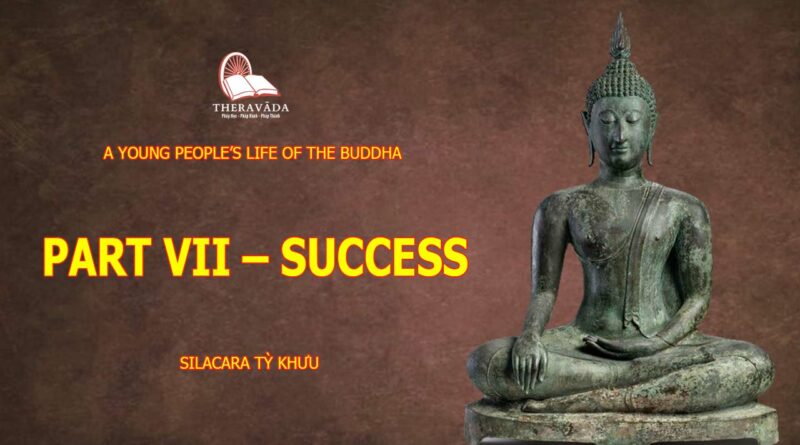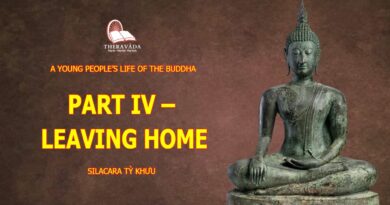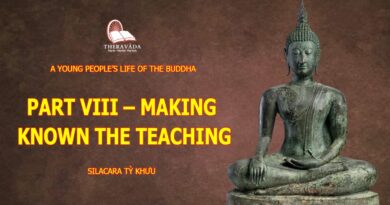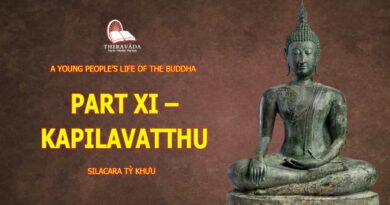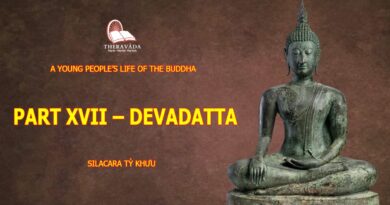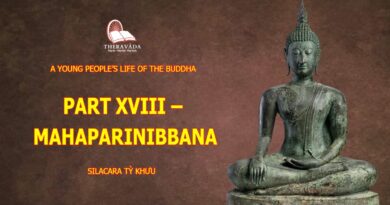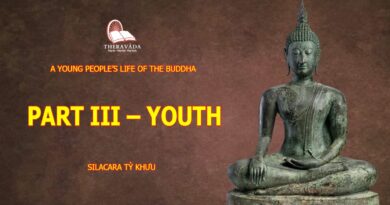A YOUNG PEOPLE’S LIFE OF THE BUDDHA: PART VII – SUCCESS
Any one to-day who wishes to see the very spot where, twenty-five hundred years ago, Prince Siddhattha of the Sakya race at last found the Truth he had sought so long and with such painful efforts, need only go to the town of Buddha Gaya in Behar, and from there walk six or seven miles along a road which more or less follows the course of a broad, sandy stream now called the river Phalgu, but which in those days was called the Neranjara. As he comes near his destination, he will see rising above the neighboring flat fields on a slight elevation, a tall solid structure of dark stone, with a few terraces running round its oblong form, which rises into the air, growing smaller and smaller towards the top where there is a small open platform from which rises a spire of stone, of the solid Hindu pattern, the whole structure being decorated with a great variety of sculptured work of all descriptions. This is the celebrated monument of Buddha Gaya. And in the shadow of this great memorial structure, surrounded by a low stone wall, the visitor yet may see the tree beneath whose branches Prince Siddhattha at last obtained the light he sought; for it was towards this tree that he turned his steps one evening, having resolved to make one last mighty effort of mind and will, and penetrate the final secret of life and all existence.
And as he went towards that tree — in memory of Siddhattha’s great achievement ever since called the Bodhi Tree, or Tree of Enlightenment — Sujata’s words to him must have been in his ears: “May you be successful in obtaining your wishes as I have been!” For now he sat down beneath the tree and made a solemn vow to himself that even if all the blood in his veins dried up, and all his flesh wasted away, and nothing was left of his body but skin and sinews and bones, from this seat he would not rise again until he had found what he sought, reached his goal, discovered for himself and for all men the way by which they might gain the highest happiness, be delivered once and for all from the need to be born and to die, again and again in a wearisome, never-ending round of the same pleasures and pains, over and over again. He sat down there under the Bodhi Tree, resolved to sit there, no matter what might happen to him, until he had discovered the way that leads out of Samsara, the world of birth and death and change, to the constant, lasting, deathless state called Nibbana.
This was a tremendous resolve to make. It had never been made before by any mortal man of our epoch of the world. There were indeed many other ascetics and hermits in Siddhattha’s native land of India, who had spent long years of bodily hardship and severe mental labor, in order to obtain what they thought was the highest good possible. But what they won after all their years of toil and struggle of mind and will, was the attainment of a very great happiness, only it was not a constant, lasting happiness. It was not permanent. It was not for ever secure against all chance and change. After a time, when the energy they had put forth in order to bring them to these high states of bliss in the heaven-worlds was all exhausted; all spent, then these people, these ascetics and hermits, fell down again from these blissful states to lower states of existence, to life on this earth again, with all its unpleasantness and disappointments. It was with them as it might be with a man who had gathered together a lot of money in a box, and started spending it all. Very soon it would all be spent, the box would be empty, and he would have to begin getting more. And so with these hermits and ascetics, if they wanted to enjoy great happiness again, they had to begin all over again the painful things they had done before, so as to get to the heaven-world again and enjoy its delights. And this they would have to do again and again as long as they wanted such delights. Again and again they would have to go through a course of misery endured on earth so as to get happiness in heaven, and then the same again, always and always, without any end. Their way of doing was like that of a man who with great trouble rolls a heavy ball to the top of a high hill, only to find it roll back to the bottom again; whereupon he has to go through all the labor of rolling it up the hill again, and has to do this over and over again, without any end to his labor.
But what Siddhattha wanted was to find some way by which he and all men would not need any more to be for ever rolling the ball of life to the top of some high peak of happiness, see it roll down again into the valley of unhappiness, and then have all their work to do over again, if they wanted happiness again; and this for ever and ever, without any end to it. He wanted to find some state that would be permanent and lasting, some kind of wellbeing that would not be lost again, so that those who reached it once, would not need any more to be always striving and struggling to get it again. And on this great night under the Bodhi Tree at Uruvela he was determined to find such a state of lasting wellbeing, or perish in trying to find it. And now when Siddhattha wished to give the whole force of his mind to this great work, his mind fought against his will, and turned itself to dwell upon all the unlasting, all the passing, temporary delights and pleasure of life that he ever had tasted. He wanted to leave aside whole thoughts of worldly things, and concentrate all his attention upon trying to find out how all things arise, but his thoughts, in spite of all he could do, turned back to his former pleasant life, and brought before his mind’s eye the most attractive pictures of the happy life he used to live in his father’s palace before he came out on this painful search for Truth.
Again he saw before the eye of his mind, the splendid rooms and halls of his palace, its beautiful grounds and gardens, its lovely lotus-ponds and bowers of delight; and the many attendants who had nothing else to do but wait upon his will and minister to his pleasure. And then he saw his beautiful young wife; her lovely pleading eyes, her pleasant charming ways rose before him in vision; her very voice, so low and sweet, sounded in his ears. And then he saw his little son, his only child, a merry little babe who might grow up to be a son of which any father might be proud. And he saw his father, too, grey-haired now, and getting on in years, and grieving that his eldest son was not beside him to help him to govern the country and take his place when soon he would have to give it up through sheer old age.
With his mind’s eye the prince-ascetic Siddhattha Gotama saw all this, and his heart misgave him as the thought he did not wish to think, forced itself into his mind:
“You might have had great glory and power as a famous king if you had stayed in household life like everybody else. But you have gone and left behind you all that sensible people prize and value, in search of something nobody but yourself has ever even thought about, something that perhaps never can be found at all, perhaps does not even exist for anybody to find! How do you know you are not a fool or a madman to leave behind all these real, solid things you certainly once had and enjoyed, to look for something you cannot even be sure exists for you to find?
“But even if you so want to leave the good things of the world behind you and go in search of something beyond them which you think is better, why could you not continue to search for it in the same way that other religious men search by fasting and mortification and the other religious practices all the other ascetics and religious men of the country follow? Is it likely that they are all wrong in their way of looking for religious truth, and that only you are right? And any way, why cannot you be content to gain the same kind of happiness they are content to gain, even if it is not as lasting as you would like it to be?
“Life is short. Men soon die: soon you too will die. Why do you not use the little time you have to live in getting all the pleasure you can out of it before the night of death comes on, when you cannot have pleasure any more? There is love: there is fame: there is glory: there is the praise of man: all to be had if you try for them: all solid, certain things: all of them things you can feel, not dreams and visions made out of thin air. Why should you make yourself wretched in this lonely forest looking for something nobody has ever found?”
Thus did Siddhattha’s thoughts torment him on that great night when he sat down beneath the Bodhi Tree to seek the way of deliverance from birth and death, tormenting him with the keen memory of the pleasures he had left behind, with doubts about his power ever to find what he sought, with uncertainty about whether he was seeking it in the right way. But he did not allow himself to be turned from his purpose. Rather did he the more strenuously pull his mind together for a yet stronger effort to discover what he wanted.
“Begone, Mara, Evil One!” he cried. “I know you who you are. You are the evil spirit that would keep men back from everything that is good and great and noble. Try no more to keep me back from what I have set out and am determined to do. My mind is made up. Here I sit until I have found what I seek, even if I have to sit until all the blood in my body dries up, and my flesh wastes all away, and nothing is left of my but dry skin and bone.”
And there Siddhattha sat and still continued sitting, striving and struggling, laboring and wrestling with all his mind and will to find what would bring to an end all infelicity, all undesirable and unpleasant things, searching for what would end all evil things for ever, and bring in their place a wellbeing, a happiness that would not pass away, a felicity that would be sure and lasting, eternally beyond the reach of any change.
And he was successful. After a time as he still persisted in his meditations, putting away out of his thoughts all evil things that were trying to disturb him and distract his mind, at length his mind became still and quiet like a still and quiet lake. It ceased to trouble him with memories and suggestions of pleasures he once had owned and enjoyed. It vexed him no more with doubts and uncertainties about what he now was seeking. In the calm, close concentration of his mind, now wholly calmed and collected, in the intense power of his will now directed towards one thing only, there where he sat under the Bodhi Tree, Prince Siddhattha, the ascetic of the face of the Sakyas, of the family of Gotama, became the Enlightened One, the Awakened One, the All-Knowing One; he became Gotama the Buddha, the bringer of the light of truth to the men of this epoch of the world, to the whole human race that now lives on the earth. For now He was enlightened in a way compared with which all other men were stumbling and groping in the dark. Now He was awake in a way compared with which all other men are asleep and dreaming. Now He knew with a knowledge compared with which all that other men know is but a kind of ignorance.
For now He had penetrated the real true meaning of life through and through from its root upward. Now He knew how and why men were born and died again and again, and how they might cease thus to suffer repeated birth and death. But the first thing He saw clearly with His new and penetrating insight this night as He sat meditating under the Bodhi Tree, was the long line of His own lives and deaths through ages after ages, in all kinds of bodies, in all kinds of conditions of life, low and high, humble and exalted, gross and refined, until at last He was born in this present life as the son of King Suddhodana and Queen Mahamaya.
Then with His keen, penetrating power of mind, He next perceived how all men are born and pass away again, to be born elsewhere anew, strictly according to the deeds they do. He saw how some are born to happy lives because their deeds were good deeds; and He saw how others were born to lives of unhappiness because the deeds they did were evil. He saw as plainly as anything that it is men’s own actions and nothing else whatever which make them happy or unhappy in this and in all worlds.
And then, last and greatest of all He saw on this great night, He saw and understood clearly, beyond all doubt, that is it not well for men always to be at the mercy of the continual changes of the world; that it is not good that they should be now happy and now unhappy, now up and now down, like boats tossed on a sea. He perceived that the reason why men come in to existence to be thus tossed about on the waves of the changing world, is because they are fond of, and cling to all the little bits of happiness that existence in the world provides at times. He saw that men are caught in the snare of existence in the world because like deer they fling themselves greedily upon any little bit of pleasure they see. Then He saw that if men do not want to be caught in the snare of existence, the only way for them to do is not to jump heedlessly upon every scrap of pleasure they see, not to abandon themselves recklessly to its enjoyment, not to set their hearts so eagerly upon the things existence offers. And then He saw the Way by following which men at length would be able to refrain from flinging themselves recklessly into enjoyment of pleasure, because they would have learnt to know and like something better, and so they would no longer be bound to come back to the world where such pleasures are found, to the world of change and disappointment and uncertain happiness, and would be able to attain the true and certain happiness of Nibbana. And this Way or Path, He called the Noble Eightfold Path, because it is the Path followed by everybody who has noble aims and desires; and it has eight distinct branches or parts or members.
The first branch or part or member of this Noble Eightfold Path to deliverance from all things evil taught by the Buddha is called — Right Seeing. This Right Seeing means, to see that everything in the world, even one’s own existence, is changeable, not really solid and lasting, and so only leads to disappointment and pain when we cling to it too closely. Right Seeing also means to see that good deeds always lead to happiness and evil deeds to unhappiness, both here and hereafter.
The second member of the Noble Eightfold Path was called by the Buddha — Right Mindedness. This means an attitude which, because it sees rightly the nature of the world and everything in it, turns away from clinging tightly to it. Right Mindedness also means a right attitude of mind in which we have pity and compassion for all beings who, through clinging too close to worldly things, are suffering distress of body or mind, while at the same time we have a keen desire to relieve their suffering and help them as far as possible.
Right Speaking, the third part of the Buddha’s Noble Eightfold Path, means speaking only what is true and kindly and sensible. It means to avoid lying and rude and slanderous and silly talk.
Right Doing, the fourth part of the Noble Eightfold Path, means to refrain from killing, and stealing, and impurity, and the drinking of intoxicating liquors which make men mad and reckless so that they do things they otherwise would never have done.
Right Living, the fifth part of the Eightfold Path, means earning one’s living in any way that does not cause hurt or harm to any other living creature.
Right Endeavour the sixth part of the Noble Eightfold Path, means endeavoring, trying to control one’s thoughts and feelings in such a way that bad, harmful thoughts and feelings may not arise, and that those which unhappily may have arisen, may die out. It also means trying to keep alive and strong in our minds all good and helpful thoughts and feelings that already are there and causing to arise in our minds and hearts as many as we can of new, good and helpful thoughts and feelings.
Right Remembering, the seventh member of the Noble Eightfold Path, means always remembering, never forgetting, what our bodies really are, not thinking of them as finer and grander than they are actually. It also means remembering all the movements and actions and functions of the body as being just the movements and actions and functions of the body, and nothing else beside. Right Remembering also means remembering what our minds are, a constantly changing succession of thoughts and feelings in which nothing is the same for two moments together. And it means, lastly, bearing in mind and never forgetting the various steps Buddha has taught us we must take in order to set the mind free from all bondage and bring it at last to the state of perfect freedom — Nibbana.
And Right Concentration, the eight and last member of this Noble Eightfold Way to Nibbana made known by the Buddha means not allowing our minds to wander about as they like, but fixing them firmly upon whatever we are thinking about, so as to arrive in this way at a correct understanding or whatever we are trying to understand.
Such are all the eight parts or members of the Noble Eightfold Path which Prince Siddhattha Gotama, who now became the Buddha Gotama, discovered under the Bodhi Tree at Uruvela twenty-five hundred years ago. The last three parts or members, Right Endeavoring, Right Remembering and Right Concentration, in their full and perfect meaning are mainly intended to be practiced by men who are trying to follow the Buddha closely, and in order to do this better and more easily, have left the household life and become Bhikkhus. But every one, whether he is a Bhikkhu or not, can practice them to a certain extent as they are here described.
The first two members of the Eightfold Path, also, Right Seeing and Right Mindedness, in their full perfection are only possessed by those men who, after many years of training and practice of meditations, at last have come very near to understanding and realizing the true nature of things in the same way that the Buddha did. Yet still, every one who wishes to follow the Buddha, must have a little of Right Seeing, and a little of Right Mindedness. They must think sometimes how all things round them are not really so fine and splendid as they often seem to be. And they must sometimes entertain in their minds the thought that some day they will turn away from the transient things of the world to something better, to something more sure and lasting.
But the three middle members of the Noble Eightfold Path are for everybody to practice to the fullest extent of their powers. Everyone ought to try to live without doing harm to any one either in word or in act. Every one ought to try, and can try to avoid wrong-speaking and wrong-doing; and according as they do this, they prepare the way for some day controlling their thoughts and properly training their minds, and so coming at last to true knowledge and insight, that knowledge and insight which the Buddha discovered and teaches, which is truly called Wisdom.
And when they come to this true wisdom, then the mind is delivered from clinging any more to anything in any world. And because it does not cling any more to such things, therefore it does not any more for ever take shape or form in any world. That is to say: For if there is no more being born into the world, and so no more of all the troubles and unpleasant things that follow men who are born into the world; and so the whole mass of distress of any kind is brought to an end for ever. All this the Buddha discovered beneath the Bodhi Tree: He discovered the Noble Eightfold Path of Right Seeing and Right Mindedness, of Right Speaking and Doing and Living, of Right Endeavoring and Remembering and Concentration, which is also called by the name of the Triple Path of Right Behavior, Mind-culture and Wisdom; or in the Pali, Sila, Samadhi, and Panna.
Source: Budsas.net

